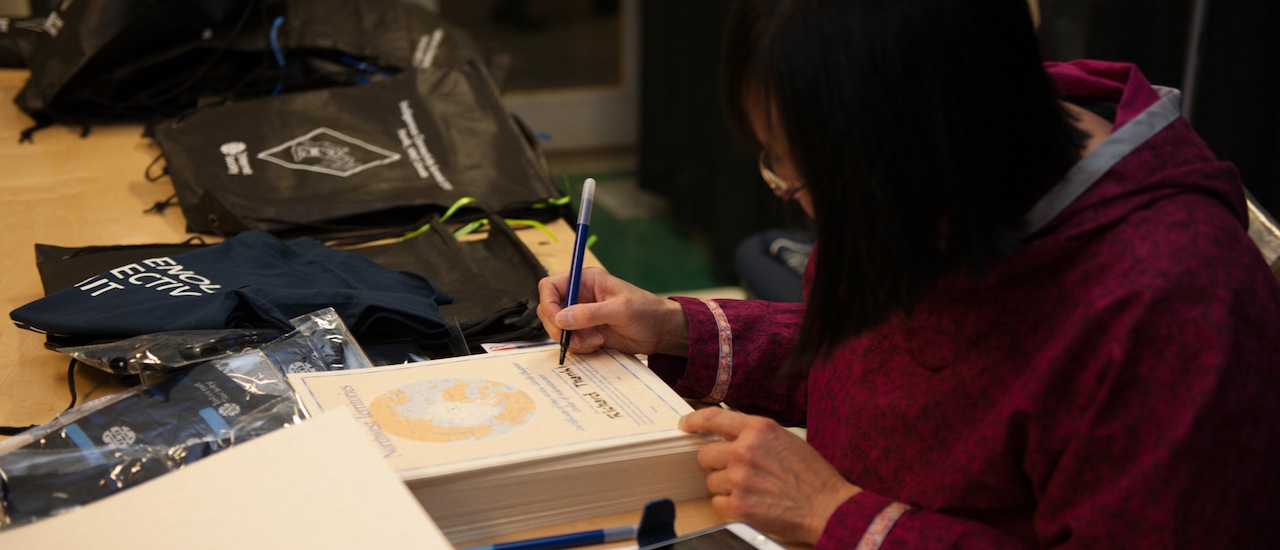COVID-19 has moved many of our lives online, and our conversations around how to further broadband access are no exception. This year, the Indigenous Connectivity Summit is happening virtually for the first time.
After meeting in Santa Fe, Inuvik, and Waimanalo and Hilo, this year we had planned to meet in Winnipeg – the city with the highest Indigenous population in Canada. We will sorely miss seeing our ICS community in person, but we are excited to meet online and demonstrate how important it is for Indigenous communities to connect to the Internet.
An important aspect of the ICS is the space created for community members to engage in conversations sharing similar challenges, connecting with one another, and innovating solutions to the lack of broadband access in their communities. We are excited to continue having these impactful conversations virtually and to recreate a more discussion-based environment than in a typical webinar format. We are also looking forward to having new faces join us this year. Without the barrier of travel, we can now engage with more participants from different communities.
The conversations we hold at the ICS hold significant weight in the policy world. Take our conversations around the Tribal Priority Window last year as an example. At the 2019 ICS, we discussed how to best advocate for the Federal Communications Commission (FCC) to extend the Tribal Priority Window for tribes applying for spectrum. After the ICS community and other partners began advocating for this important issue, the FCC extended the window, first by 180 days, from ending in February to ending in August, then with an additional 30 day extension.
As a result of that extension, we were able to conduct outreach to nearly 220 tribal communities. Our partners in that outreach, Matthew Rantanen (Southern California Tribal Chairmen’s Association), Geoffrey Blackwell, and Irene Flannery (both from AMERIND Risk, Inc.), won the inaugural Digital Opportunity Equity Recognition (DOER) Award from FCC Commissioner Geoffrey Starks this year for their work conducting outreach to Indigenous communities around the Tribal Priority Window. The Commissioner also honored them for their work creating short- and long-term connectivity solutions for tribes.
One of our favorite moments from the ICS last year was the ethernet crimping workshop with the community at Pu’uhonua o Waimanalo. Grandparents and parents sat with children learning to prepare the ethernet cable together. The generations of community members training together stood as a testament to the importance of capacity building in the community – the network is better prepared to last for years to come because everyone in the community can learn to maintain it and pass the skills along to others.
It will be difficult to replicate this environment virtually this year. But we want to do our best to create a hands-on training experience where participants can lean on each other for support and feel the success of putting together a small part of a community network. For US- and Canada-based participants who registered by 11 September, we sent “ICS kits” with the tools they need to partake in an ethernet crimping training. These kits include a crimper, some short ethernet cables for practice, shielded and unshielded connecters, a tester, cable boots, and some conference goodies from us.
It’s not too late to sign up for these conversations and trainings. You can learn more about our 2020 ICS, read the agenda, and check out who is speaking here. Register and take part in these important conversations here. Many thanks to our platinum sponsors Google and Facebook, our silver sponsor Baicells, and our bronze sponsor Cybera for supporting the 2020 ICS!

